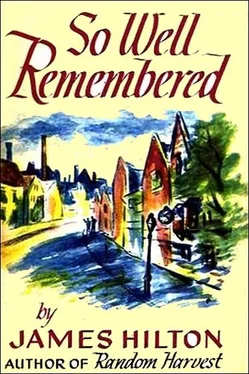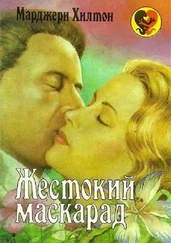Джеймс Хилтон - So Well Remembered
Здесь есть возможность читать онлайн «Джеймс Хилтон - So Well Remembered» весь текст электронной книги совершенно бесплатно (целиком полную версию без сокращений). В некоторых случаях можно слушать аудио, скачать через торрент в формате fb2 и присутствует краткое содержание. Год выпуска: 1945, Жанр: Проза, на английском языке. Описание произведения, (предисловие) а так же отзывы посетителей доступны на портале библиотеки ЛибКат.
- Название:So Well Remembered
- Автор:
- Жанр:
- Год:1945
- ISBN:нет данных
- Рейтинг книги:5 / 5. Голосов: 1
-
Избранное:Добавить в избранное
- Отзывы:
-
Ваша оценка:
- 100
- 1
- 2
- 3
- 4
- 5
So Well Remembered: краткое содержание, описание и аннотация
Предлагаем к чтению аннотацию, описание, краткое содержание или предисловие (зависит от того, что написал сам автор книги «So Well Remembered»). Если вы не нашли необходимую информацию о книге — напишите в комментариях, мы постараемся отыскать её.
So Well Remembered — читать онлайн бесплатно полную книгу (весь текст) целиком
Ниже представлен текст книги, разбитый по страницам. Система сохранения места последней прочитанной страницы, позволяет с удобством читать онлайн бесплатно книгу «So Well Remembered», без необходимости каждый раз заново искать на чём Вы остановились. Поставьте закладку, и сможете в любой момент перейти на страницу, на которой закончили чтение.
Интервал:
Закладка:
“By the way,” George added, as an afterthought, “have you a list of all the men in the University—not just this college only?”
He had, and George inspected it. It did not take him more than a moment to find that Winslow was at St. Jude’s. The porter then told him where St. Jude’s was and he walked there across the town.
He did not know whether he really intended to visit Winslow or not, but as he was strolling towards the College entrance he saw a man leaning on two sticks walk out towards the kerb and there hesitate, as if uncertain whether to risk crossing. George caught his glance from a distance and immediately changed direction to help him; whereupon the man turned away, evidently deciding not to cross after all. But the whole manoeuvre puzzled George, so that he approached nevertheless and asked if he could be of any service. The man was a tall young fellow in a rather ill-fitting tweed jacket and grey-flannel trousers, with a hat turned down over his forehead in such a way that, with the further obstruction of dark glasses, the face was hardly to be seen.
Yet immediately—from some curious instinct rather than from any arguable recognition—George knew who it was. He had never seen him dressed before, or even standing up before, yet there was not a shadow of doubt as he exclaimed: “Why, Charles…” and took the other’s arm.
Charles stared at him for a moment before forcing a smile. “I—I didn’t expect you’d recognize me.”
“Don’t say you didn’t want me to!”
“I won’t say it if you’d rather not.” The voice and the tone were ironic. “What are you doing in these parts, anyhow?”
George explained and added heartily: “No need to ask what YOU’RE doing.”
“Isn’t there? At present I’m going to have my hair cut by a barber who most obligingly does it for me privately every third Sunday afternoon. I can’t face that sort of thing when there’s the usual audience.”
George nodded with understanding. “Then I mustn’t keep you. But perhaps afterwards… How about having a meal with me?”
Charles declined with a brusqueness that softened into an only slightly irritated explanation that he hardly ever left the College after dusk. “For one thing there’s the damned black-out.” And then, either shyly or grudgingly (George could not be sure which): “I’m in Room D One in the First Court. Come up tonight after dinner if you like. About eight.”
George had been intending to return to London by the seven-thirty train, but he cancelled the arrangement quickly enough to accept without an appearance of hesitation. A later train, however inconvenient, would do all right. He said: “Thanks, I will. And now, since you WERE wanting to cross the street…”
He helped the boy as far as the opposite kerb, then left him after a few conversational commonplaces. George’s sense of timing was never, indeed, so infallible as when he found himself up against that rare phenomenon— someone who didn’t seem particularly glad to see him.
He spent an hour or two in further sightseeing, then made his way to St. Jude’s after another bad meal. The night was cloudy, and the staircase leading to D One proved hard to find, even by enquiry. To George’s astonishment, after he had knocked, the door was opened by a rather pretty girl in nurse’s uniform who admitted him to a large pleasant room in which Charles, with one arm bared to the shoulder, had evidently been undergoing some sort of treatment which George’s arrival had interrupted. George apologized for being early (though actually he was punctual), but Charles assured him the job was finished and introduced the girl, who joined in unimportant conversation while she packed her equipment. She seemed very charming, friendly, and efficient, and George, whose mind always flew to Browdley on the slightest provocation, wished he had her in the towns health department. He had also noticed the state of the arm, and Charles, aware of this, felt constrained to cover a certain embarrassment by making light of it. “Still have to be patched up, but I’m sure a lot of fellows would envy me the method.” The girl laughed and made business-like arrangements for her next visit. She demurred at first as George picked up her bag, but when he insisted she let him carry it down the stairs. Outside the door he said: “It isn’t just that I’m being polite. I’d really like to know how that boy is, and I thought you’d be the one to give me the true facts.”
She replied calmly as they walked across the court and through the gateway into the street: “He’s not well at all—but that’s a usual experience after the sort of crash he had. They seem to improve, and then they get worse again. It’s partly because they expect to recover too soon and too completely —and it doesn’t happen.”
“But it will eventually—in his case?”
“He has a good chance. Physically he’s doing fine. He fractured both ankles, and one of his hands and arms had bad burns—that’s the one I’m working on—the muscle’s damaged. And his face, too—that was burned, but they did a wonderful job with plastic surgery—I’ve seen a photograph of him as he used to be and it’s really remarkable. Of course the shock is really the hardest thing to get over.”
“But he WILL?”
“I hope so, though he’s pretty bad at times. He has sudden nerve- storms —you can’t imagine what they’re like until you’ve seen him… But he should improve gradually.”
“It all sounds serious enough,” George said.
“It is—though I’ve seen many worse. And he has heaps of courage. You know he got a D.F.C.?”
“No?… When was that?”
She mentioned a time earlier than that of George’s visits to the Mulcaster Hospital.
He said: “He never told me.”
“I’m not surprised.”
“But isn’t he proud of it?”
She smiled. “He’s just shy about those things, that’s all. Do you know him well?”
“Not very. But I—I like him a great deal.”
“So do I.”
They had reached the pavement where she said she would wait for a bus. George would have liked to go on talking, but the bus came up almost immediately. “And where are you off to now?” he asked, curious as always about the lives and work of others.
“Back to the hospital here. They keep me busy.”
“I’ll bet they do,” he answered admiringly. The bus moved away and he walked back to the College room encouraged by a feeling of community with all who worked with such quiet, cheerful skill—the real aristocracy on earth, he reflected, if there ever were such a thing.
Charles had put on his coat and was making sure the curtains were drawn over the windows. George apologized again for having arrived perhaps inopportunely.
“Not at all… Sit down. You’ve had dinner, of course. How about some coffee? I make it here, on my own.”
George agreed and watched Charles as he busied himself with the small but intricate task. It was as if he wanted to show how he could do things— as if embarrassment, aware of itself, could find relief in a kind of exhibitionism. He made excellent coffee, anyhow, and over several cups they fell to discussing the business that had brought George to London, which George explained in as much detail as was interesting to himself until it occurred to him that Charles might not be similarly enthralled. But the boy urged him to continue. “Go ahead. It’s shop talk, but I always enjoy that from anyone who knows what he’s talking about.”
George acknowledged the compliment with a pleased ‘Aye’, and then, to keep it modest, added: “So long as it’s anything to do with Browdley… Now tell me YOUR gossip.”
“Nothing to tell except a lot of dull stories about hospitals.”
Читать дальшеИнтервал:
Закладка:
Похожие книги на «So Well Remembered»
Представляем Вашему вниманию похожие книги на «So Well Remembered» списком для выбора. Мы отобрали схожую по названию и смыслу литературу в надежде предоставить читателям больше вариантов отыскать новые, интересные, ещё непрочитанные произведения.
Обсуждение, отзывы о книге «So Well Remembered» и просто собственные мнения читателей. Оставьте ваши комментарии, напишите, что Вы думаете о произведении, его смысле или главных героях. Укажите что конкретно понравилось, а что нет, и почему Вы так считаете.










